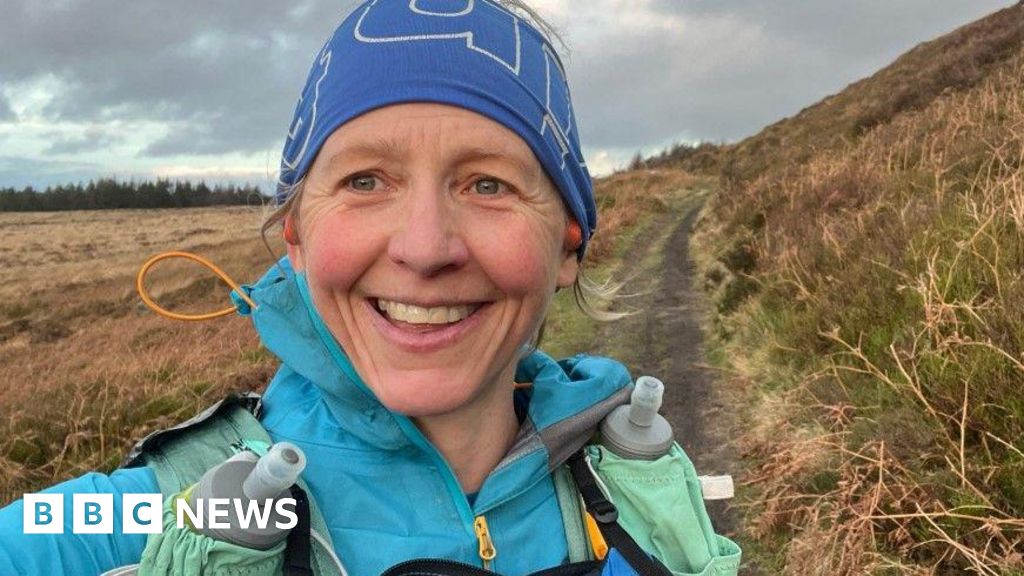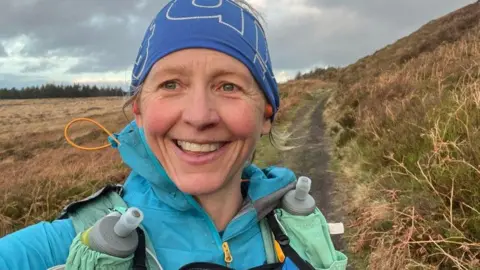 Lucy Gossage
Lucy GossageWhen Lucy Gossage stood on the start line of an ultra-marathon in January, she realised she had already succeeded.
One year earlier, the cancer doctor had completed the same 268-mile (430km) race – described as the most brutal in the UK – alongside her partner.
But shortly after finishing, she discovered he had been cheating on her.
Lucy, who studied at the University of Cambridge, decided to return to the event to gain some closure, and went on to win it.
Here, in her own words, she explains how it has changed her life and her definition of success.
‘I was trying to do everything as quickly as possible’
Growing up, I wasn’t very sporty and I remember coming last in a cross-country race when I was 14.
That put me off doing anything competitively. I didn’t like to do anything I might not succeed in.
I’ve always worked incredibly hard but I often lack confidence in myself. I studied medicine at Cambridge, but worried I didn’t deserve to be there and that I was going to fail.
I went on to study at Oxford before I moved to Nottingham as a junior doctor and then got a job as an oncology trainee.
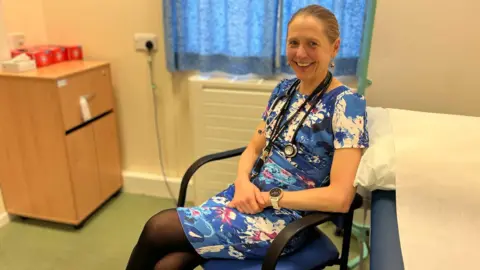 Lucy Gossage
Lucy GossageLooking back, I was trying to do everything as quickly as possible and always pushing to get to the top.
I then moved back to Cambridge to do a PhD in kidney cancer and was spending hours in laboratories doing research. I was miserable, I missed seeing patients, so I threw myself into training for triathlons.
I’d entered my first one as a drunken dare after a relationship ended. I absolutely loved it and I told my friends that if I was still single on New Year’s Day, I would do an Ironman, even though I’d only just heard of it. I’ve always needed to be out of my comfort zone to feel alive.
‘Choosing to suffer is a privilege’
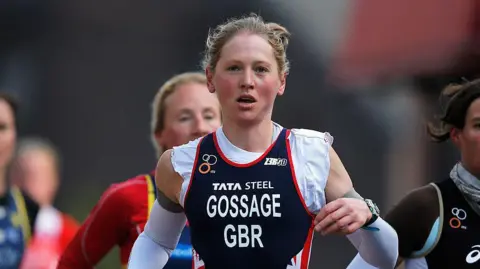 Getty Images
Getty ImagesI loved my first Ironman and I was training really hard during that period of my life. At the age of 34, I became a professional triathlete, which was never my plan.
In 2016, I broke my collarbone eight weeks before the Ironman World Champs and it was my mindset that carried me to the finish line.
I ended up becoming a 14-time Ironman champion. It wasn’t because I was the most talented. Nothing has ever come easy to me but I’m determined and stubborn. I’ve always had to work incredibly hard but I’m proud of that. I wouldn’t enjoy something if it came too easy.
Two years later, I retired from triathlon and returned to my job as an oncologist full-time. I feel grateful I had a career to come back to that I love.
Around the same time, I co-founded 5k Your Way, now part of the charity Move Against Cancer, to help cancer patients be active and build back confidence in their bodies.
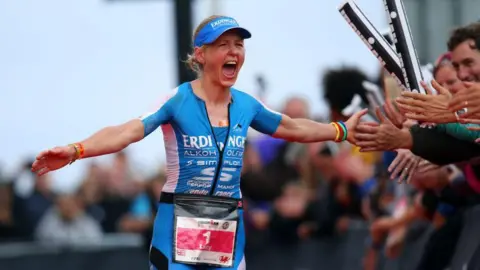 Getty Images
Getty ImagesThe day I realised I was ready to retire, I had just won a race in Majorca. I saw some photos of the Nottingham 5k Your Way group and I realised I wanted to be there instead. That was when I knew I no longer wanted to throw everything into being as fast as I can.
Oncology reminds me that I’m lucky to have a body that can do what I make it do. In a race I use the mantra ‘choosing to suffer is a privilege’.
I now specialise in treating testicular cancers and sarcomas. People with cancer inspire me to live my life differently and make the most of every opportunity.
‘My world came crashing down’
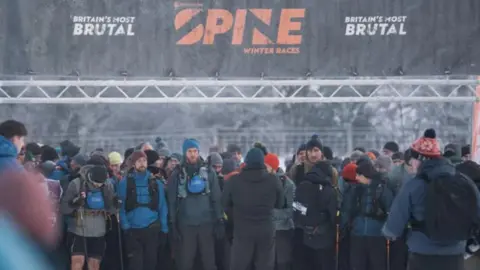 Montane Winter Spine
Montane Winter SpineDuring Covid, my ex-boyfriend and I ended up walking across Wales and we loved it.
We talked about entering a crazy ultra-running race called The Montane Winter Spine and spent three years working towards it.
It covers 268 miles (430km) up the Pennine Way, from Derbyshire to Scotland. It’s non-stop and you carry a pack with everything you need to survive, with five checkpoints along the way where you can sleep.
Last January, we both completed it and it was amazing but it pushed me to my limits. It was so hard, I ended up sleepwalking. I made so many mistakes in terms of sleep and nutrition but the race gave me everything I wanted and I had no desire to repeat it.
A few days later, my world came crashing down. A friend had taken over my social media during the race and received a messaged that my boyfriend was dating another woman.
I never imagined it would happen to someone like me but anyone can be deceived and manipulated.
After several months I realised I needed to go back to the race to close that chapter and reclaim those memories for myself.
‘Getting to the start line felt like I’d won’
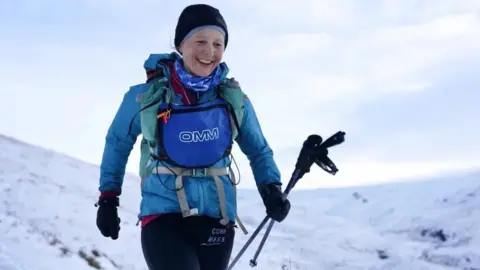 Jack Mather
Jack MatherJust before the race in January, I published a blog about what happened. I was so nervous putting it out there but it was my way of processing it and I wanted to break down the stigma surrounding betrayal in relationships.
There is a perception that manipulation only happens to people who are vulnerable or desperate, but that’s not true.
I had emails from so many women who had similar experiences. I found it quite validating and humbling that people shared their stories with me. One woman said it was like holding a mirror up because it resonated so much with her.
I’d struggled with sciatica for eight weeks leading up to the race, making running painful and incredibly slow. But I was never going to not start. There were snow storms and freezing temperatures at the start but nothing could put me off.
Just getting there felt like I’d won. I realised I’d already done the hard work. I’d spent all year training but I’d also been processing what happened.
During the race, I rested for three hours in the 87 hours of running. I managed to grab an hour’s sleep in some public toilets and had some power naps lying down on the trail.
At the start of night two, I was going up a mountain and it was raining and there were gale force winds so the snow was melting and I kept falling down. But after that the sun came out and it was glorious.
I never intended to win it, but I realised part-way through that I had a good chance so I just went for it and was the first female across the line. My friends and family were there and I played Sweet Caroline running down the last hill.
I just felt huge relief at first. It took a few days to sit back and say ‘Wow, that was special.’
‘I was racing for me’
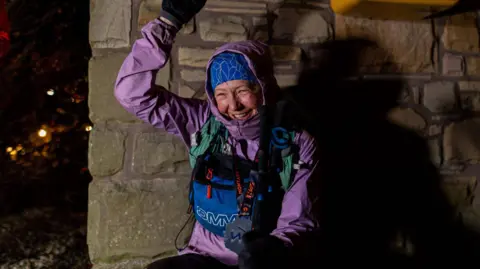 Adam Jacobs
Adam JacobsLooking back, I’m convinced my performance came from the release of this pure joy, a feeling that had been buried for a year. I wasn’t racing for closure in the end, I was racing for me.
I’m still working out what to do next. Do I want to race or just go on adventures? I enjoy finding something you think will be impossible and proving it’s not.
Most ultra-runners would assume I’d want to get as good as I can, but I don’t want to get sucked into taking it as seriously as I did with triathlon.
Last year’s race changed my life and so did this one. One of the greatest things to come out of it has been the community of women, of all ages and backgrounds, that I have met along the way and we all became each other’s cheerleaders.
I’m proud of myself for surviving the last year. I’m back feeling myself again, which is the main thing.
